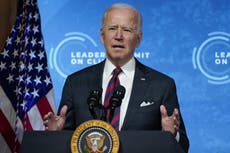US will not be lifting any travel restrictions ‘in short term’ over Covid Delta variant
‘Given where we are today with the Delta variant, the United States will maintain existing travel restrictions at this point,’ Press Secretary Jen Psaki says


The White House has said that they will “maintain existing travel restrictions” on international travel because of the increasing spread of the Covid-19 Delta variant and rising case rates.
“The more transmissible Delta variant is spreading both here and around the world,” White House Press Secretary Jen Psaki said during a press briefing on Monday. “Driven by the Delta variant, cases are rising here at home, particularly among those who are unvaccinated and appear likely continue to increase in the weeks ahead.”
The decision follows a White House meeting of senior officials late on Friday and means that the restrictions that have stopped large parts of the world’s population from reaching the US since last year won’t be removed in the short term, Reuters reported.
Airlines have been pushing the White House for months to lift the restrictions in the hope to regain lost ground, but summer travel to the US by Europeans and others covered by the restrictions now seems unlikely.
The United States currently prohibits most non-US citizens from entering the country if they in the last two weeks have visited the UK, the 26 Schengen nations in Europe without border checks, Ireland, China, India, South Africa, Iran, and Brazil.
The travel restrictions were first imposed by the Trump administration against China in January 2020. India was the most recent country to be added to the list of restricted countries in early May.
The US Department of Homeland Security said last week that land borders with Canada and Mexico would remain closed until at least 21 August even as Canada has said they would open the border to fully vaccinated Americans on 9 August.
During a joint press conference with German Chancellor Angela Merkel on 15 July, President Joe Biden was asked when US travel would be opened up to Europeans. He said he would “be able to answer that question... within the next several days”.
Ms Merkel said any decision to open up would have to be a “sustainable decision. It is certainly not sensible to have to take it back after only a few days”.
Cases in the US have spiked since that press briefing. The director of the Centres for Disease Control and Prevention (CDC) Rochelle Walensky said on Thursday that the seven day average of cases in the US had risen 53 per cent compared to the week before.
The Delta variant was first detected in India and can now be found in more than 90 countries and makes up 80 per cent of new cases in the US.
Ms Psaki noted during the Monday briefing that the CDC has urged Americans to avoid travelling to the UK because of a rise in cases.
The administration has been criticised by people who have been stopped from seeing their families.
“The administration understands the importance of international travel and is united in wanting to reopen international travel in a safe and sustainable manner,” a White House official said on Monday.
Ms Psaki said on Friday that international travel is “something we would all like to see – not just for tourism, but for families to be reunited”.
“We rely on public health and medical advice on when we’re going to determine changes to be made,” she added.
The Biden administration has not said what metrics they would use to decide when it’s time to open back up. It also hasn’t said if it would remove restrictions on individual countries or if it would focus on improving traveller safety.
The White House has discussed the possibility of mandating vaccinations for international travellers, but a final decision is yet to be made, according to Reuters.
The administration has also been in touch with US airlines to discuss putting in place protocols for international contact tracing before the lifting of travel restrictions.
Early last month, the White House put together interagency working groups along with the European Union, Britain, Canada and Mexico, to figure out how and when to lift border restrictions.
Compulsory Covid-19 testing requirements were imposed by the CDC on almost all international travellers in January.
Join our commenting forum
Join thought-provoking conversations, follow other Independent readers and see their replies
Comments


Bookmark popover
Removed from bookmarks